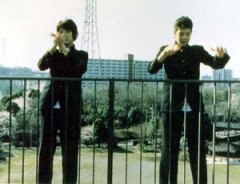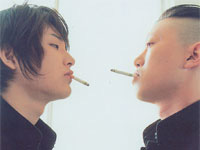A gripping tale of teenage hopelessness.
This adaptation from Taiyo Matsumoto's manga Aoi Haru portrays a group of high school failures who quite simply don't know what to do with their life. From that very usual situation, which has already been abundantly depicted elsewhere in modern cinema, director Toyoda succeeds in sketching an informative piece of fact about Japan's massive dropout phenomenon, while telling a touching tale at the center of which lies the fate of two friends, Aoki and Kujo.
In a high school, youths who devote themselves to school gang activities rule out who their boss should be thanks to a deadly clapping game. Today is Kujo's turn to be the boss, and he proves to be one of the baddest that ever was...The film revolves around the paradoxical situation of these young punks who have not entirely renounced to fulfilling their dreams (sportive careers in some instances), but who eventually flunk every chance they get, lose their grips with reality and fall off of their own accord (which tends to make the clapping game a very good metaphor for their situations), when they do not freak out and sink into base homicide. The pupils led by the charismatic Kujo (Riuhey Matsuda, whose talent has been noted since Oshima's Taboo) are left to wander around their school, messing around and incapable of putting their respective lives into perspective, and there is an obvious absence of parental and adult figures throughout the movies, but a shift eventually intervenes for Kujo when he starts paying attention to a dwarf teacher—one of the rare trusted adults of the movie—through botany and an experiment that gives him the sense of how absurd it is to be budding and doomed at the same time.
chance they get, lose their grips with reality and fall off of their own accord (which tends to make the clapping game a very good metaphor for their situations), when they do not freak out and sink into base homicide. The pupils led by the charismatic Kujo (Riuhey Matsuda, whose talent has been noted since Oshima's Taboo) are left to wander around their school, messing around and incapable of putting their respective lives into perspective, and there is an obvious absence of parental and adult figures throughout the movies, but a shift eventually intervenes for Kujo when he starts paying attention to a dwarf teacher—one of the rare trusted adults of the movie—through botany and an experiment that gives him the sense of how absurd it is to be budding and doomed at the same time.
I have not read the manga and therefore won't judge whether the film is faithful to its model or not, and among the few flaws which could be ackowledged—the lack of psychological credibility for some of the characters, the suddenness of Aoki and Kujo's separation— could all be toned down by the fact there's been an obvious synthesis of an extended work. And besides, despite the crudeness and triviality of these young people's pastimes, there is still an ethereal and dream-like atmosphere which justifies the unlikeliness of such characters and situations, and an unquestionable brooding beauty which culminates with the superb shot of Aoki spending his night on the roof of the school while time unfolds all around him.
In this respect, Blue Spring is successful both as a realistic portrayal of Japan's modern youth and as an oneiric and universal fable about friendship.
could all be toned down by the fact there's been an obvious synthesis of an extended work. And besides, despite the crudeness and triviality of these young people's pastimes, there is still an ethereal and dream-like atmosphere which justifies the unlikeliness of such characters and situations, and an unquestionable brooding beauty which culminates with the superb shot of Aoki spending his night on the roof of the school while time unfolds all around him.
In this respect, Blue Spring is successful both as a realistic portrayal of Japan's modern youth and as an oneiric and universal fable about friendship.

